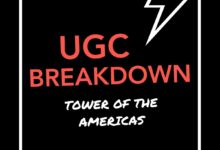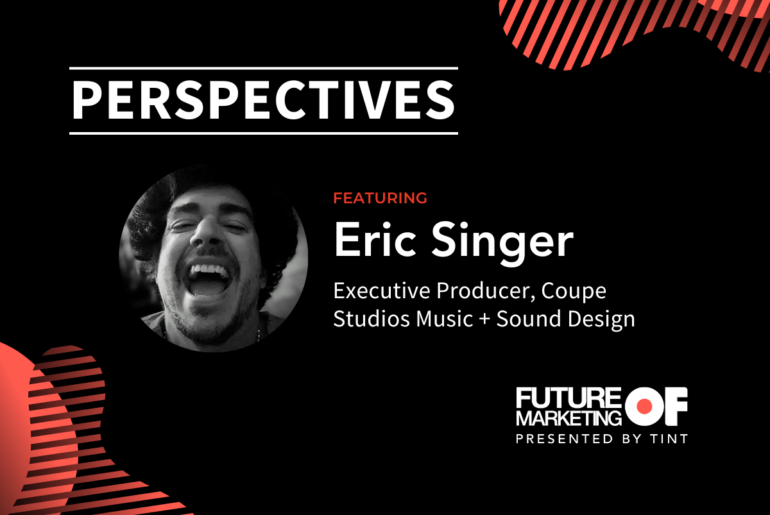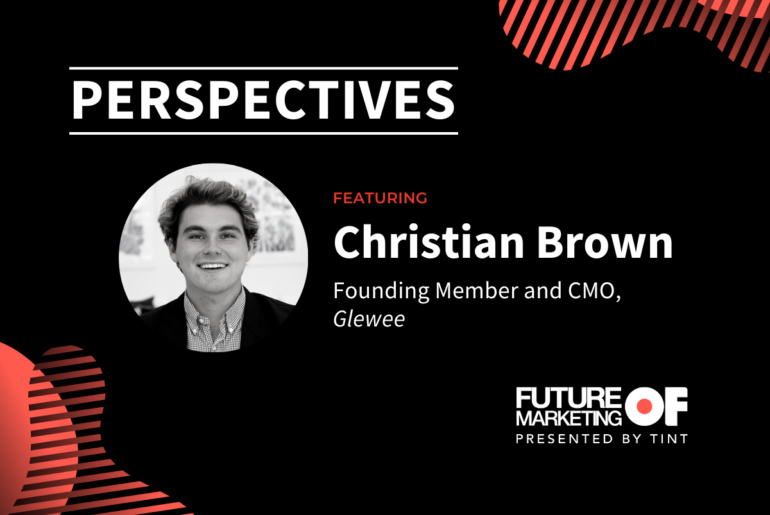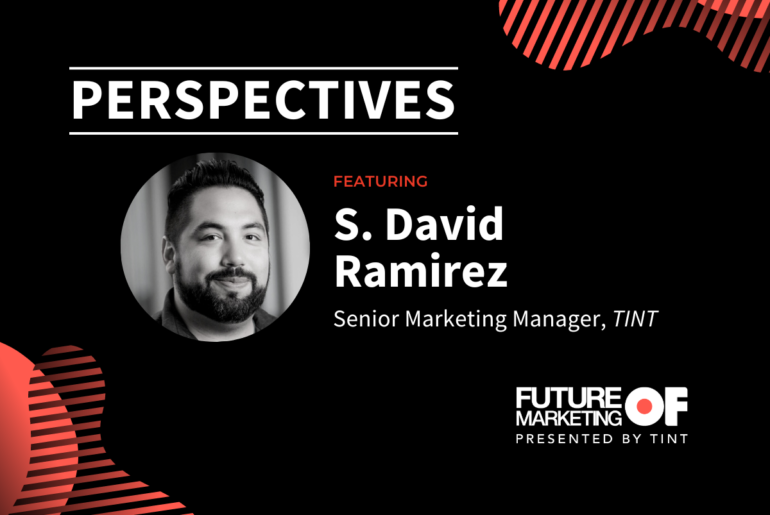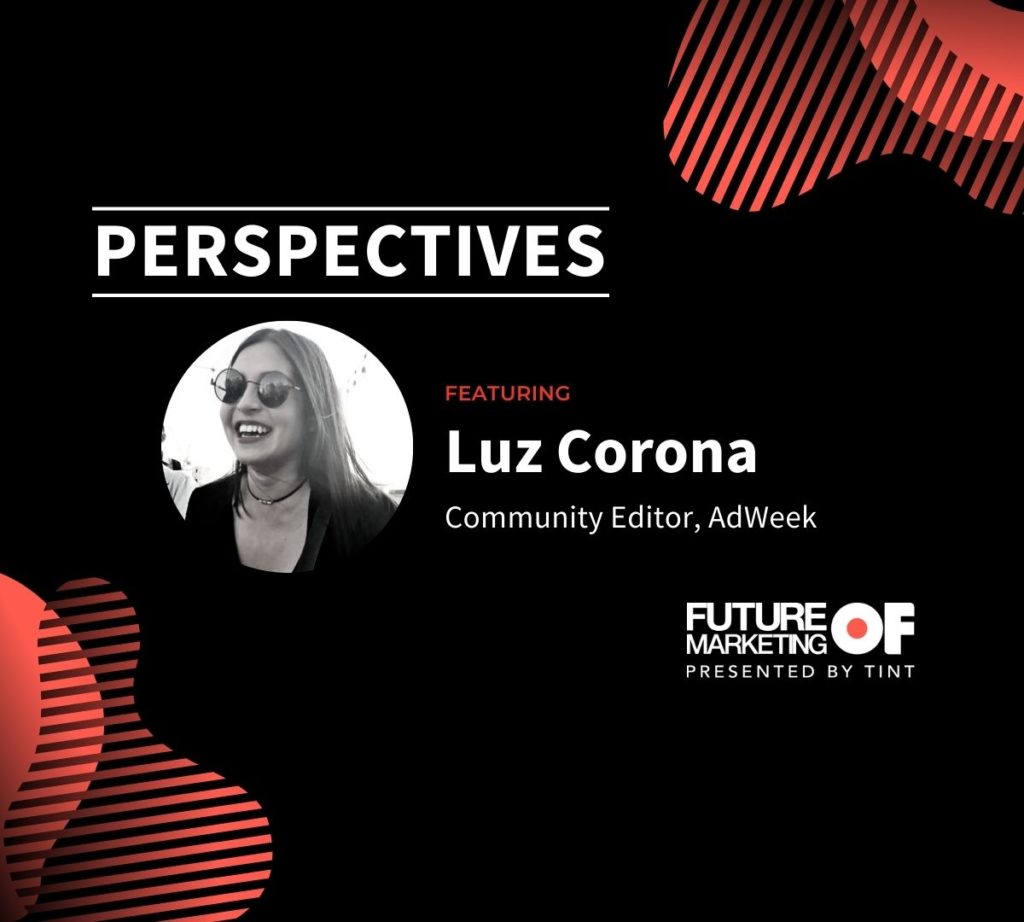
Perspectives is a series uncovering routines, inspiration, and insights by marketing leaders shaping the future around the globe.

Perspectives ft. Luz Corona, Community Content Manager, AdWeek – Future of Marketing
EDITOR’S NOTE: At the time of this conversation, Luz Corona was the Community Content Manager at AdWeek and has since been promoted to Community Editor. She shares:
- Why user-generated content is valuable for brands
- The importance of mindfulness and presence
- Her advice for other marketers
What does it really take to be a Community Content Manager at AdWeek? What does your typical day look like?
My typical day-to-day varies, which I feel like a lot of marketers can say these days – but mainly, working on content that is more focused on the community. We have our editorial team at AdWeek that does more of the news component and we kind of do it in a different way, where we feature people in the community. We’re constantly connecting and engaging with them, and that’s really what our team does.
Then, specifically, I work on the Women Trailblazer series and currently oversee our voice column, which is op-ed pieces. Every day is different, but equally as fulfilling.
What is the Voice Column, exactly?
It’s our op-ed column at AdWeek, so people from the industry send us pitches or ideas for articles on whether it could be a trending topic, or a moment in the industry and they want to chime in on it – or it could be like an advice piece. For example, we have someone write a great piece on how brands can really be advocates for Olympians during the Olympics, so it can vary. It depends what’s going on at that time, but it’s really interesting to hear perspectives from everyone.
Where do you typically get your marketing insights and news from?
I can only say AdWeek [laughs].
I know this sounds silly, but I’m always on social media – seeing what’s trending, what the latest headlines are – specifically on Twitter. But, really, AdWeek and looking at what’s going on in the world – LA times, New York Times – and keeping up with different newsletters that touch on different things like copywriting or different topics in the industry.
Do you have a favorite newsletter?
Nicole Tabak’s – it’s such a different kind of newsletter for marketers.
[It’s about] being mindful and having grace on yourself – more like a mental health kind of thing – and I think it’s so needed today. I’m a big fan of that one – and this isn’t marketing-related, but I have been a big fan of the Anti-Racism Newsletter lately.
DEI is super important to me, so just learning a whole other perspective and really breaking down topics that people need to be educated on – besides what’s [happening] on Twitter.
Speaking of mental health, 2020 and 2021 have been very crazy years for a lot of marketers. What’s something you’ve learned during these last two years?
I have the privilege of writing the Women Trailblazer series, so I get a lot of advice from people that I aspire to be, and people I admire and look up to. What I found a lot of them say is – and this is what I take to heart – to give yourself patience. This is a really challenging time for all of us, and it’s really important to be be kind to yourself.
There are days where I’m impatient with myself or hard on myself – being a working mom or just seeing things in the news – and I just remember to take it day by day. Not every day is easy, but not every day is hard either.
Let’s talk about social media. What is something that you feel that people need to STOP doing on social media?
Negativity on social media can really spread like wildfire – everyone has opinions, everyone has perspectives, but people need to stop being disrespectful.
That’s something I try to be conscious of too. No one’s perfect – but if people disagree with something, they need to stop being so aggressive and maybe figure out how to phrase it and get their point across. There are always going to be the bots and the bullies on there, but I think that’s really something I’ve seen come up.
What’s something that you feel marketers should start doing more?
What I love seeing on social media for marketers is community building.
I guess I’m on the right team at AdWeek for that, but just seeing how many people connect on there and not being shy – people should start being a little bit more vulnerable. It’s something I’ve learned in the past few months as well; it’s okay to be vulnerable and open because there are other people that could possibly relate to it or chime in.
I’ve seen a lot of that on Twitter, especially like in the social media manager community. I see it through my colleague, Julian. He does such a great job with that relationship building and I think that’s really inspirational and something to take.
I’m curious to hear a little bit more about your thoughts on user- and employee-generated content. Why do you think they’re so valuable for brands?
UGC gives brands an opportunity to showcase their consumers and connect to their consumers.
User-generated content is created by the consumers of these brands as well, so it’s like them pretty much putting out a silver platter – like this is what I’m interested in and this is what I’m creating. There’s just something about the raw, unpublished component of it that it doesn’t feel highly overly produced. It feels natural. I don’t want to use the authentic word too much, but it is authentic. It’s real. And it’s an opportunity for brands to really drive connection with their consumers.
What do you feel most marketers struggle with and how can they fix this?
Something I saw the other day that I thought was really interesting… someone was talking about their brand, really working on their overarching strategy – the umbrella strategy and how to tie everything into that. I feel like marketers struggle with that.
It’s so easy to chase after the shiny object – and that’s important as well… to chase after the trending moments. But how can you tie your brand into that? It’s also important for employees and marketers to be clear on the overarching message and the goal of the brand – because if you’re going and commenting on something and it has nothing to do with the industry you’re in or your product, it could come off as unnatural.
I saw someone the other day saying that they really took almost more than a year to figure out the forward vision of the brand and then, making sure all the employees understood it. That’s so important because your employees are your ambassadors as well, so bringing them along for the ride is critical.
What do you think the future of marketing looks like and how can teams prepare?
Strategy comes into play again and just really knowing who your brand is and what it stands for because what I’ve seen is people are going to still keep calling out brands for not being authentic or caring enough. We’ve seen it a lot with DEI pledges. People are calling them out a year later.
Where are the numbers? Where’s the data? Know what your brand stands for, [ensure] anything that you put out there really connects to that, and just make good on your word because consumers are watching.
Also, is it being echoed within the hallways of the company as much as it is being out there in the press?
What is the book person or event that you feel helped shape your career and why?
I don’t know about shaping my career, but, I’ll go with the non-technical marketing book, it’s called Breathe, Mama, Breathe. It’s about being more mindful and present, and that’s something that has really helped me with my work as well – being mindful and conscious of my work output, and whether I’m spreading myself too thin. And could this be as good as it could be?
Then, the most recent marketing book I feel like I really take to heart and enjoy reading is Junior by Thomas Kemeny. I know this is a popular one, but really it’s such a great, easy read. He breaks it all down for you; it’s a book about copywriting, but you could really take a lot of things to heart in there about how it shapes your writing.
Where do you look for inspiration?
Social media is really coming up a lot, but I’ve been trying to get back more into reading and more into the storytelling part, so that’s kind of the skill that I’m trying to beef up.
But reading the LA times, looking through stories and perspectives I’m interested in, and I know they’re lengthy posts on Instagram, but if there’s a real story there, I take note of it. I guess it’s learning from storytellers… that’s really what I’m looking for.
What advice do you have for marketers and creatives who look up to you?
It’s important to set goals and make them attainable, but keep your eye on the prize and know that it’s okay to, again, have grace on yourself. Sometimes life just happens. It doesn’t mean that you’re not going to get to the goals that you want to accomplish. Sometimes life just happens and some things need to be put on hold or shifted around and reprioritized, but it doesn’t mean you’re not going to get to where you want to be.
When I moved to New York City, it’s what I found. It was a lot of hard work in the beginning, and a lot of “am I going to make it?” or “am I going to actually get to where I want to be?” You just have to work hard and just be your own advocate.
It’s so easy to take yourself down, but there are so many things already working against you. Why would you be one of them? That’s something that I really try to remember every single day.
Something else I’m learning is just enjoying the journey a little bit more. It’s something my mother-in-law recently reminded me of. She handed me the book, The Missing Piece by Shel Silverstein – and she was like, “you need to read this.”
Spoiler alert: it’s about the journey and enjoying the ride, the mistakes, falling down, getting back up, and remembering what you’ve learned from that.
How do you wind down from a long day of work?
I would say it depends on what my need is that night – like a walk outside after dinner with my family (that’s something I try to do). After the day winds down – after the baby’s in bed and everything – I love film and TV.
I’m not being a couch potato, but I’m actually watching and studying them, listening to the script, or really getting into what I’m watching. It’s a nice activity for me to really be into it and just take my mind off of the day’s events.
I see things from a production standpoint and you just can’t shake it out sometimes.
What are you most excited about or looking forward to?
I think this past year, just being in this role, I’ve been able to learn so much from other marketers. I feel more motivated and energized to go for my goals a little more; I’m inspired by these Women Trailblazers… I’m reading this and absorbing it. It’s almost like I’ve been handed a textbook of “How to be a Badass Woman.”
I guess that goes career-wise, too – just getting to where I want to be.
There are career goals that I want to reach that could be like a whole other career in 10 years, and just trying to stay hopeful and keep my eye on the prize. And I know this shouldn’t come last, but just being a good mom and being present; it’s difficult and it’s easy to get swept up in the day-to-day, but just enjoying these little moments that are just flying.
What do you think the future of marketing will look like?
What I see now is data plays a big role, but it’s also important to remember that these are humans you’re marketing to – so trust your gut instinct as well. The data will lay things out for you and outline behaviors, but it’s also important to remember that these are human beings… so listen to that human instinct.
Subscribe to Future of Marketing for weekly strategies and interviews with top marketing leaders like Luz.

